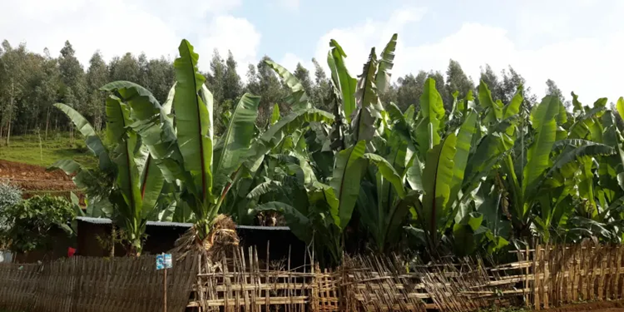
Ethiopia being home to the second largest population in Africa has been working tireless to boost its agricultural production and productivity. The country grows diversified crop species as it embraces diverse climate condition.
The Ethiopian endemic Enset crop is one of the significant crops that play a crucial role in providing food security for millions of people in Ethiopia. Enset is a perennial crop that is native to Ethiopia and is commonly referred to as “false banana” due to its resemblance to the banana tree. Enset has been a staple food crop in Ethiopia for centuries, particularly in the southern and southwestern parts of the country.
Enset is a highly resilient crop that can withstand drought, pests, and diseases, making it an essential crop in regions with harsh weather conditions. The crop is also highly adaptable to different soil types, making it suitable for cultivation in various parts of the country. The Enset tree is not only a source of food but also a source of income for many households in Ethiopia. Enset is rich in nutrients, and its various parts are used for different purposes. The edible part of the Enset plant is its underground stem or corm, which is rich in carbohydrates and dietary fiber. The corm is harvested and processed into a starchy food product known as “kocho,” which is a staple food in many parts of Ethiopia.
Moreover, the Enset leaves are also used for wrapping food and making cooking utensils and baskets. Enset plays a crucial role in food security in Ethiopia, particularly in regions where other crops may not thrive. The crop is highly drought-resistant, making it a reliable source of food even in times of drought.
Enset has also been found to be effective in soil conservation, as it has a deep root system that helps to prevent soil erosion.
Recently, the Royal Botanic Gardens Kew Plant diversity and conservation researchers stressed the paramount importance of Enset’s resilience to ensure Ethiopia’s food security and combat future climate impact challenges.
Enset, which is also known as Ethiopian banana or false banana, has remarkable versatility, drought resistance, and disease tolerance. It is a staple source of nutrition for more than 20 million people in Ethiopia.
Research leader in Trait Diversity and Function at Royal Botanic Gardens Kew James Borrell told local media that Ethiopia is one of the most remarkable countries for its agro biodiversity and crop diversity as well as linguistic and cultural diversity.
Royal Botanic Gardens Kew, has been working for more than 40 years researching Enset crop, particularly in the aspects of drought and climate resilience, he said, and added “Enset is globally unique; Ethiopia should be so proud of this remarkable crop that was domesticated in the country,” he added.
“Enset is very unusual and you can harvest it at any time of the year. You can store and you can buffer seasonal food security. So, (if) we particularly think under climate change, Enset has a very important role to play. But, perhaps, historically it has been a little bit under researched. And we feel very grateful to have the opportunity to work together with many organizations in Ethiopia, Ethiopian Biodiversity Institute, Addis Ababa University (AAU), Gulele Botanical Garden to work together to understand the unique crop,” the researcher explained.
According to him, the Royal Botanic Gardens Kew has been undertaking researches over the past eight years to map the distribution of Enset and its drought resilience.
“We are also sequencing many hundreds of varieties of Enset with AAU to understand diversity within that amusing diversity of more than 1,500 different types of Enset plant. Within this diversity are varieties that will be tolerant of future climate change. We are working to try and describe that diversity… so that Ethiopia can meet the challenges of climate change,” Borrell noted.
Sophie Richards, who specialized in conservation, biodiversity analysis, GIS, and extinction risk at the Royal Botanic Gardens Kew, said on her part that Ethiopia is endowed with crop diversity and different types of Enset.
Stating that both researchers have visited 300 farms and spoke with farmers; she pointed out the invaluable role played by Ethiopian farmers in agro biodiversity conservation.
“Many of the small holder farmers in Ethiopia have been providing an incredible service by maintaining high diversity Enset on their farms without reward, without benefit and it is a huge service for the country to adapt climate change in the future and provide resilience and food security,” she elaborated.
Researchers anticipate that with a high yield and resilience to long periods of drought, Enset could be a climate-smart crop for the future.
Despite its numerous benefits, Enset cultivation is facing several challenges. One of the major challenges is the lack of awareness and knowledge about the crop among farmers and policymakers. Many farmers are not aware of the crop’s potential and its role in food security, and policymakers have not given it the attention it deserves despite its significant contribution to the country’s economy. Another challenge facing Enset cultivation is the lack of access to markets and processing facilities.
Most Enset farmers rely on traditional processing methods, which are time-consuming and labor-intensive. This makes it difficult for them to produce Enset products on a large scale and sell them in the market. There is a need for investment in processing facilities and market linkages to help Enset farmers access wider markets and increase their income.
In sum, the Ethiopian endemic Enset tree plays a critical role in food security in Ethiopia. It is a highly resilient crop that can withstand harsh weather conditions, making it a reliable source of food in regions where other crops may not thrive. Enset cultivation, however, faces several challenges, including lack of awareness and knowledge, and limited access to markets and processing facilities. There is a need for increased investment in Enset cultivation and market linkages to help farmers access wider markets and increase their income.
BY TEWODROS KASSA
THE ETHIOPIAN HERALD SATURDAY 30 MARCH 2024





